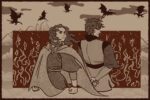Making it big in the literary world is hard for anyone when reading is at an all-time low. But when authors do manage to achieve success, readers flood through the gates to support the fandoms with art, fan fiction and more. The examples of impactful literature are all around us. The Wizarding World of Harry Potter at Universal is one of the most popular attractions to explore at the theme park complex, and asking “What’s your Hogwarts house?” isn’t an uncommon icebreaker. Meanwhile, Camp Half-Blood from Rick Riordan’s “Percy Jackson” series has become a reality made possible by Between-the-Pages. As seen with “Forrest Gump” and the “Game of Thrones” series, popular books and stories become popular movies and TV shows.
But what happens when authors grow stagnant with their books? Comforted by a familiar world, supportive fans and guaranteed financial stability, authors end up sticking with the books that made them famous. The author that is perhaps guiltiest of this act is J.K. Rowling.
The seven-book series that made up “Harry Potter” was finished over a decade ago in 2006. However, new stories set in its universe continue to surface, the most recent one being “The Cursed Child,” a two-part play marketed as the eighth official story in the “Harry Potter” series.
More maddening, however, is the fact that Rowling continues to add to the world of “Harry Potter” on either her Wizarding World website, formerly Pottermore, or Twitter. For example, on Pottermore, Rowling wrote that there are many wizarding schools around the world, among them, Ilvermorny, the wizarding school in North America. There are entire character studies and fleshed out backstories from the ancestry of the Potter family to details about Harry’s Aunt Marge. None of this information ever featured in the original series.
Meanwhile, on Twitter, Rowling makes constant amendments to her characters. Following a tweet about whether there are any Jews at Hogwarts, Rowling replied that Anthony Goldstein, a Ravenclaw in Harry’s year, is a Jewish wizard. Other details Rowling has added include Moaning Myrtle’s full name, the fact that there is “mutual respect… [regardless of] race” in the wizarding world and that Albus Dumbledore is, in fact, gay.
.@ridd1kulus No, there was mutual respect and a sense of kinship between all wizards, no matter what their race.
— J.K. Rowling (@jk_rowling) March 8, 2016
There was a reason these details didn’t feature in the original series. Rowling’s attempt to make her series more progressive, as evidenced by Goldstein’s religious alignment and Dumbledore’s sexuality, doesn’t sit well with many readers. Such attempts to be inclusive should be addressed in the books themselves, not after they’ve already been published. By constantly coming up with new backstories and explanations for her characters, both major and minor, Rowling takes away the opportunity for the characters and the wizarding world to live on in her readers’ imaginations.
With Rowling’s focus now on the “Fantastic Beasts” film series, she continues to loiter in the ranks of authors who can’t leave their resolved stories behind. Cassandra Clare’s “Shadowhunter Chronicles,” for example, is now composed of three completed novel series along with a litany of short story collections. Clare is working on the fourth and fifth series, and there is a sixth series expected to be published before the chronicles are wrapped up.
Then, there’s Rick Riordan, who can’t seem to give Percy Jackson a break. Aside from his titular series “Percy Jackson and the Olympians,” Jackson has had appearances in the “Heroes of Olympus” series and the “Trials of Apollo” series. He also had a cameo in “Magnus Chase and the Gods of Asgard” and interacted with Carter and Sadie Kane from the “Kane Chronicles.” Who knows how many more times Percy Jackson will be expected to save the world?
For authors, staying in an already written world and writing out the stories of established characters is akin to staying in one’s comfort zone. After all, that world already has plenty of dedicated fans who will love the story regardless of how good the writing is.
Even series that have seemed to be long finished aren’t safe. Almost 10 years after “Mockingjay” was published, Suzanne Collins has returned with a prequel to the “Hunger Games” series. “A Ballad of Songbirds and Snakes” tells the backstory of Coriolanus Snow, who will go on to become the main antagonist in the “Hunger Games” series.
Moreover, when authors continue to add to their original tales, it increases the opportunity for these adjustments to taint the source content. Readers will only compare the new stories to the original tales that have been placed on an infallible pedestal. Just look at the reception to Rowling’s “The Cursed Child.” Although the play itself won a breathtaking number of prestigious awards, including several Tony Awards and Olivier Awards, readers were quick to criticize the screenplay. Fans slammed this newest addition to the series for being out of character with its numerous plot holes, discontinuity and misguided amendments to the original series. “The Cursed Child” was seen as so outrageous that many readers don’t consider it canon and compare it to badly written fan fiction.
Even Collins, who has barely touched “The Hunger Games” until now, has seen negative reviews toward “A Ballad of Songbirds and Snakes.” Readers’ reviews describe it as a “baggy, meandering prequel” that does not live up to the original trilogy.
Continuing to branch out from an existing world makes authors more prone to discontinuities within the world. It’s inevitable that, eventually, a book will be published that will be seen as lackluster when compared to the original series or even boycotted by loyal fans.
There’s a reason that tens of thousands of fan fictions are churned out by fans every year in popular fandoms. It’s because they love these fictional worlds that still seem so real. It’s an opportunity for readers to mold the parts that the authors didn’t write — from the characters’ histories to their futures — and make it their own.
However, when authors choose to continue to stay in their worlds when the stories have long been told, it stunts their growth. The hard work in building the worlds and the characters’ arcs has already been accomplished. That’s what brings a good story to life: a character who struggles, but eventually overcomes a central challenge. The story is finished when the challenge is complete.
Writing should be about exploring new frontiers, creating new worlds and characters and putting the old ones to rest so that they can grow on their own. It shouldn’t be about playing it safe for the guaranteed rewards of fans, fame and money. The mark of a true author is someone who’s constantly breaking new ground: unafraid to pioneer new worlds and stories.
















